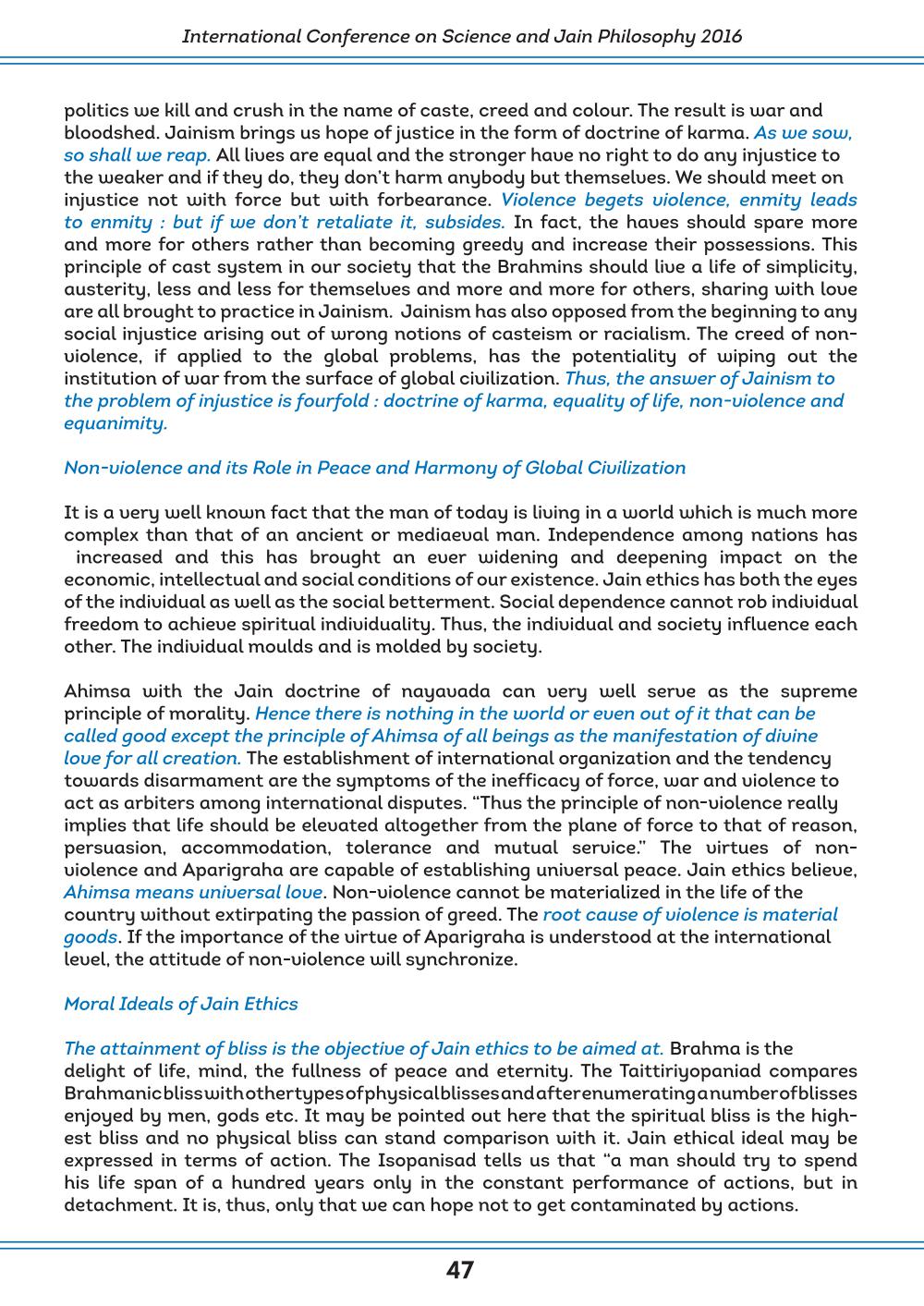________________
International Conference on Science and Jain Philosophy 2016
politics we kill and crush in the name of caste, creed and colour. The result is war and bloodshed. Jainism brings us hope of justice in the form of doctrine of karma. As we sow, so shall we reap. All lives are equal and the stronger have no right to do any injustice to the weaker and if they do, they don't harm anybody but themselves. We should meet on injustice not with force but with forbearance. Violence begets violence, enmity leads to enmity : but if we don't retaliate it, subsides. In fact, the haues should spare more and more for others rather than becoming greedy and increase their possessions. This principle of cast system in our society that the Brahmins should live a life of simplicity, austerity, less and less for themselves and more and more for others, sharing with love are all brought to practice in Jainism. Jainism has also opposed from the beginning to any social injustice arising out of wrong notions of casteism or racialism. The creed of nonviolence, if applied to the global problems, has the potentiality of wiping out the institution of war from the surface of global civilization. Thus, the answer of Jainism to the problem of injustice is fourfold: doctrine of karma, equality of life, non-violence and equanimity.
Non-violence and its Role in Peace and Harmony of Global Civilization
It is a very well known fact that the man of today is living in a world which is much more complex than that of an ancient or mediaeval man. Independence among nations has
increased and this has brought an ever widening and deepening impact on the economic, intellectual and social conditions of our existence. Jain ethics has both the eyes of the individual as well as the social betterment. Social dependence cannot rob individual freedom to achieve spiritual individuality. Thus, the individual and society influence each other. The individual moulds and is molded by society.
Ahimsa with the Jain doctrine of nayavada can very well serve as the supreme principle of morality. Hence there is nothing in the world or even out of it that can be called good except the principle of Ahimsa of all beings as the manifestation of divine love for all creation. The establishment of international organization and the tendency towards disarmament are the symptoms of the inefficacy of force, war and violence to act as arbiters among international disputes. "Thus the principle of non-violence really implies that life should be elevated altogether from the plane of force to that of reason, persuasion, accommodation, tolerance and mutual service." The virtues of nonviolence and Aparigraha are capable of establishing universal peace. Jain ethics believe, Ahimsa means universal love. Non-violence cannot be materialized in the life of the country without extirpating the passion of greed. The root cause of violence is material goods. If the importance of the virtue of Aparigraha is understood at the international level, the attitude of non-violence will synchronize.
Moral Ideals of Jain Ethics
The attainment of bliss is the objective of Jain ethics to be aimed at. Brahma is the delight of life, mind, the fullness of peace and eternity. The Taittiriyopaniad compares Brahmanicblisswithothertypes of physicalblisses and afterenumeratinganumberofblisses enjoyed by men, gods etc. It may be pointed out here that the spiritual bliss is the highest bliss and no physical bliss can stand comparison with it. Jain ethical ideal may be expressed in terms of action. The Isopanisad tells us that "a man should try to spend his life span of a hundred years only in the constant performance of actions, but in detachment. It is, thus, only that we can hope not to get contaminated by actions.
47




